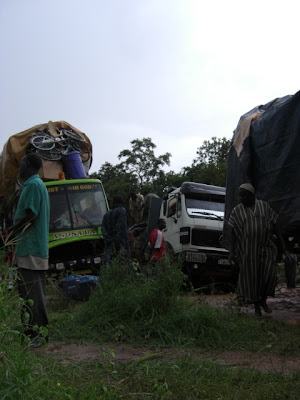After Gao, we went back to Mandoli and I spent the next couple of days in the village getting my stuff together and saying goodbyes. Then I headed out to Bamako for a few days before taking off. For your dozing pleasure, here's a little review.
I Carry Water Like the Big Men (Or, Small Women. Whichever.)
I decided to try carrying water up the cliff from the spring. So, I did some light stretching (not really) grabbed a 5-gallon jug (really) and joined the chief's first wife on her water run. Here's the break down.
Her: Age-60ish. Height: 5'2" Weight: 100lbs give or take.
Me: Age-26ish. Height: 6'2"ish. Weight: 230lbs.
And, so we set off.
Now, I think I mentioned that the women usually do the hike to the spring wearing flip-flops. But, it turned out that I was wrong. They do it barefoot. I opted for my Merrell hiking shoes.
And down we went. I can't say much about it as I'm trying to block it out. But, in sum, it was friggin' hard. I mean gut-wrenching, heart-pounding hard. Like a workout from a Rocky training scene hard. Except they wouldn't show it because the general public would never believe anyone could actually do it.
That, at least, was my perspective. The chief's wife didn't seem to have too much trouble.
After we got back to village, she didn't want me to take her picture because she didn't like what she was wearing. But, I can assure you she looked fine and exactly the same as she had when she left for the spring. Now, here I am after my triumphant and painful return. Notice the forced smile and awkwardly stiff back position? It hurt. And, Rocky, you don't even know.
Please note that only some of this is sweat. I also spilled water all over myself trying to carry the jug on my head and trying to carry it like a baby. None of those carrying positions made it any lighter. But, spilling water all over myself did.
That said, wouldn't it be crazy if my hips did sweat like that?
The Kids Get Kisses
Ms. Emily Rechter sent Hershey Kiss stickers and the kids loved them. This pic doesn't even do it justice. They loved them. And, as soon as the other kids saw them, we had a crowd outside of Heather's door. Luckily, Em sent a bunch and there were plenty to go around. It must be noted that it was undeniably cute to watch them running around with big Hershey Kisses on their foreheads.
Whenever You're Feeling Good and Hungry, It's Skyline Time.

You'll note that, in true Malian fashion, we ate the Skyline out of a communal bowl using our hands. (Re-applying crackers and cheese as necessary.) It's really an awesome way to eat it. I think we should all try it when I'm back.
 Samsonite has nothing on the Northlich bag.
Samsonite has nothing on the Northlich bag. 
43 of us (not including the goats) packed into this truck for a 20-hour trip to Bamako. This truck made Chris Baker's Prospector Van look like a Maserati. Seriously, the driver would turn the steering wheel completely around and the van wouldn't alter course an inch. Which made traversing washed out roads and the thinnest highway I've seen (at least since Ireland) all the more impressive.


Part of the reason the trip took 20 hours is because we ended up spending 5 hours next to a washed out road. It was actually kind of fun. Especially this part.
Bamako? Bama-OK!
Meet Dana and Arnim. They are awesome.




Here are some random pics of Bamako. I wish they could capture the feel of it. I'll give that a try with words at a later date. In the meantime, it's time to move on.





 Gao at dusk.
Gao at dusk.





























 These vases were beatiful. Unfortunately, my shopping advisors were not around to help me pick one out. Cherlyn, Errica, Court, Cathy, Theresa, Carey - we're going to have to come back here so I can get a vase.
These vases were beatiful. Unfortunately, my shopping advisors were not around to help me pick one out. Cherlyn, Errica, Court, Cathy, Theresa, Carey - we're going to have to come back here so I can get a vase.



